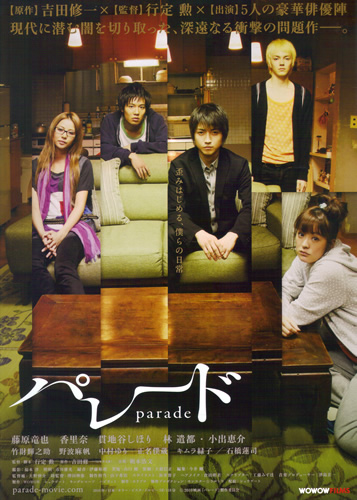WIT Life #109: Parade
WITLife is a periodic series written by professional Writer/Interpreter/Translator Stacy Smith (Kumamoto-ken CIR, 2000-03). She starts her day by watching Fujisankei’s newscast in Japanese, and here she shares some of the interesting tidbits and trends together with her own observations.
At Japan Society on Friday night I saw what has been my favorite movie of the Japan Cuts festival so far, Parade. A special treat was the attendance of the director, Isao Yukisada, to introduce the movie and take questions after. He presented the movie as a “slice of the dark side of Tokyo,” and expressed his nervousness and excitement at having his work screened here in New York for the first time. The movie explores the relationships between four young people sharing an apartment in Tokyo, as they deal with their respective troubles as well as the danger of an assailant who has been attacking women in the area. The title refers to the idea of the sheltered aspect of their lives that takes place within the four walls of the apartment and continues in the same way every day, much like the imagery of the merry-go-round that later appears in the film.
They end up acquiring a new roommate, a 19-year old prostitute, who insightfully labels their relationships as ones that don’t go deeper than the surface. They are ostensibly connecting, but the shocking climax reveals that in reality these are very tenuous bonds maintained only by mutually accepted deception, reminiscent of the theme in Hanging Garden. The cast is fabulous, especially Tatsuya Fujiwara who plays Naoki, the oldest of the group who everyone looks up to as an authority figure. Fujiwara shines in this role, and I heard he also gave a great performance as the swordsman Musashi in the eponymously titled noh-inspired play which just concluded this past weekend at Lincoln Center.
During the Q&A, Yukisada illuminated his impetus for making the film. Seven years ago after reading the book that is based on, he was so riveted by the story that he immediately purchased the film rights. Over the years they got transferred to other directors but eventually made their way back to him, which he took as fate. In terms of what inspired his depiction of the characters, he thought back to when he first came to Tokyo from Kumamoto (my JET prefecture!). At the time, he realized that when people come from the countryside to the big city, they often develop another personality as a way of reinventing themselves. In the same way, the faces that the characters in the movie show within the room and to the outside world are different. This idea of our dual natures was intriguing, as I think the reverse can be applied to us JETs who were plucked from our respective cities to live in the Japanese countryside. I had the chance to personally speak with Yukisada after the Q&A, and asked if he had a chance to screen the movie in his hometown. He said few people had attended the screening, but that he felt those who did got it.
Another of Yukisada ‘s movies, Crying Out Love, In The Center of the World, was shown the next day at the festival. I didn’t have a chance to see this one, but I have read the book and watched the drama series, both of which I enjoyed. The story of first love between two high school students is a bit melodramatic but does pull on the heartstrings. In it the girl, Aki, ends up being diagnosed with leukemia, and the boy, Saku, (played by Mirai Moriyama, who was also the love interest in One Million Yen Girl) promises to take her to Ayers Rock, which she calls “the center of the world.” Will Aki survive to make the trip, and if not, how will Saku go on with his life?
‘s movies, Crying Out Love, In The Center of the World, was shown the next day at the festival. I didn’t have a chance to see this one, but I have read the book and watched the drama series, both of which I enjoyed. The story of first love between two high school students is a bit melodramatic but does pull on the heartstrings. In it the girl, Aki, ends up being diagnosed with leukemia, and the boy, Saku, (played by Mirai Moriyama, who was also the love interest in One Million Yen Girl) promises to take her to Ayers Rock, which she calls “the center of the world.” Will Aki survive to make the trip, and if not, how will Saku go on with his life?
As for real life drama, the DPJ did not do nearly as well as it had hoped it would in Upper House midterm elections. Read NYT coverage here.


Comments are closed.